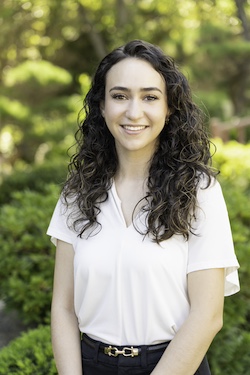Conner has a hereditary condition that causes tumors in multiple organs. In late 2023, he was being treated at City of Hope’s Duarte campus twice a month — a one-way trip of 144 miles for his family.
Conner is three years old, and his mother is also receiving cancer treatment at City of Hope.
Tara Mitchell, patient resource coordinator in City of Hope’s Department of Supportive Care, helped Conner’s family deal with the financial toll of treatment, using resources provided by The Change Reaction. “Conner understood that the kind people at The Change Reaction helped his family and was so happy to ride in a car to see the doctor,” Mitchell says.
Conner and his mother are among the 800 patients who have been helped by The Change Reaction since founders Greg and Jodi Perlman made a gift in 2020 to establish The Change Reaction Angel Fund at City of Hope.
By the end of 2023, contributions to the Angel Fund by The Change Reaction had grown to $1 million. Daphna Nissanoff-Gerendash, senior director of programs at The Change Reaction, credits the committed efforts of the incredible social workers at City of Hope for the successful expansion of the program: “The Change Reaction is about making an impact directly to patients facing unforeseen financial difficulties due to their illness. We truly could not do this work without dedicated social workers.”
Empowering social workers
Kristen Garcia, M.S.W., a clinical social worker in hematology at City of Hope says support from The Change Reaction makes her work with patients easier. She frequently requests funding to help with groceries, transportation or other resources that remove stressors for patients and let them stay focused on treatment.

“Patients are struggling financially, and that's impacting their emotional health. And some aren’t able to make it to treatment or go through with treatment or just be present in this moment,” Garcia says. “Change Reaction allows them to feel at peace. It’s one less thing they have to worry about while getting treatment.”
According to Nissanoff-Gerendash, The Change Reaction was created with social workers like Garcia in mind. She and her colleagues aim to empower social workers by giving them access to resources quickly, easily and efficiently, with no red tape: “We trust City of Hope’s social work team, that they have vetted the situation, and we follow their recommendation because they know the patients personally.”
The Change Reaction Angel Fund at City of Hope brings peace of mind to patients and equips them to better manage the costs and emotional toll of their cancer care. Sometimes this means helping with basic comforts: after years of manually boiling water one patient was able finally to replace a broken water heater with support from The Change Reaction.
Natalie Schnaitmann, L.C.S.W., Executive Director of City of Hope’s Department of Supportive Care Medicine, reflects on the impact of The Change Reaction’s support: “Clinical Social Workers, within the Department of Supportive Care Medicine at City of Hope, are often faced with patients who have financial struggles, either coming into cancer or created by the cancer. It is one of the most common challenges and literally prevents patients from accessing the medical care they need. Whether financial support for transportation, housing, or another basic need, this is life support and we’ve often had very little to offer. Obviously this is difficult for the patient and family, but for the social worker as well. With The Change Reaction, we can respond quickly with a solution and that makes all the difference.”
The Change Reaction is based in Los Angeles and partners with over 250 organizations across Los Angeles County.
“Our gifts not only bring a sense of relief to the patient, they also bring fulfillment to the social workers,” says Nissanoff-Gerendash. “Our funds give them a new sense of hope that they can make an even greater difference in the recovery of their patients.”
